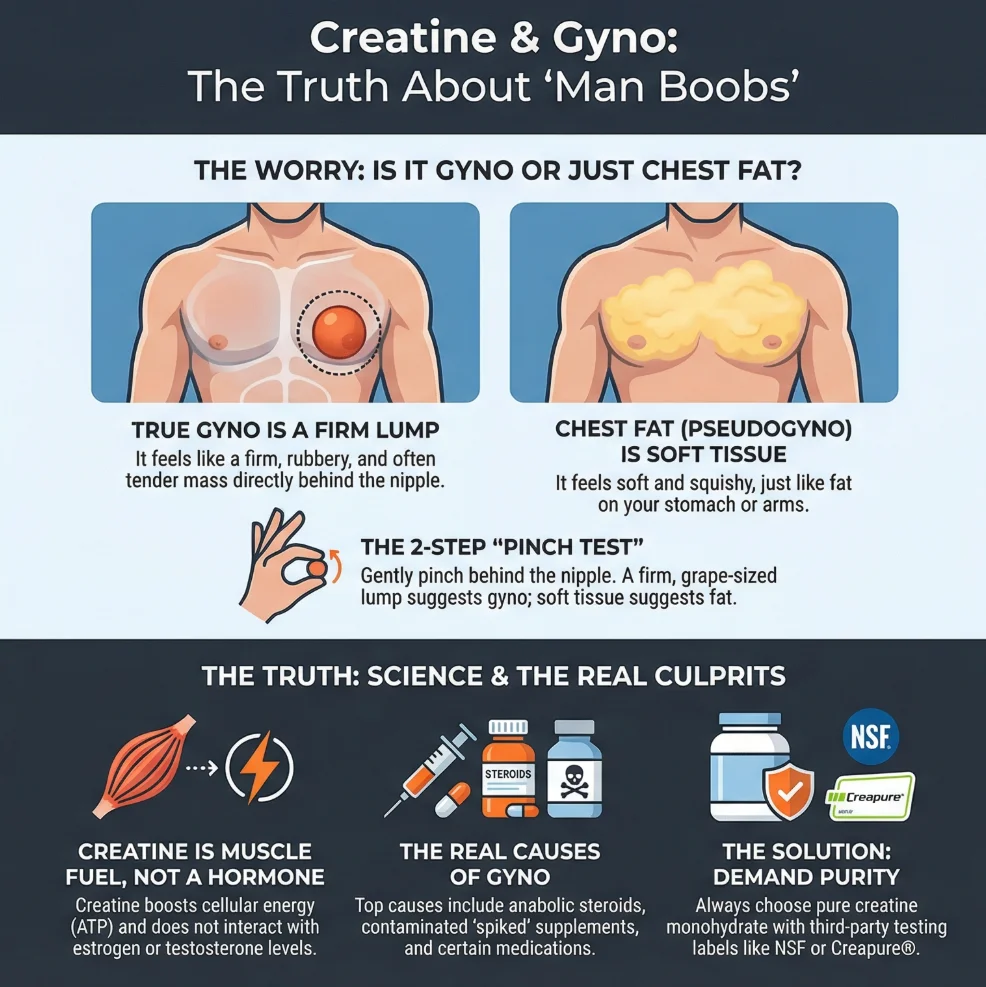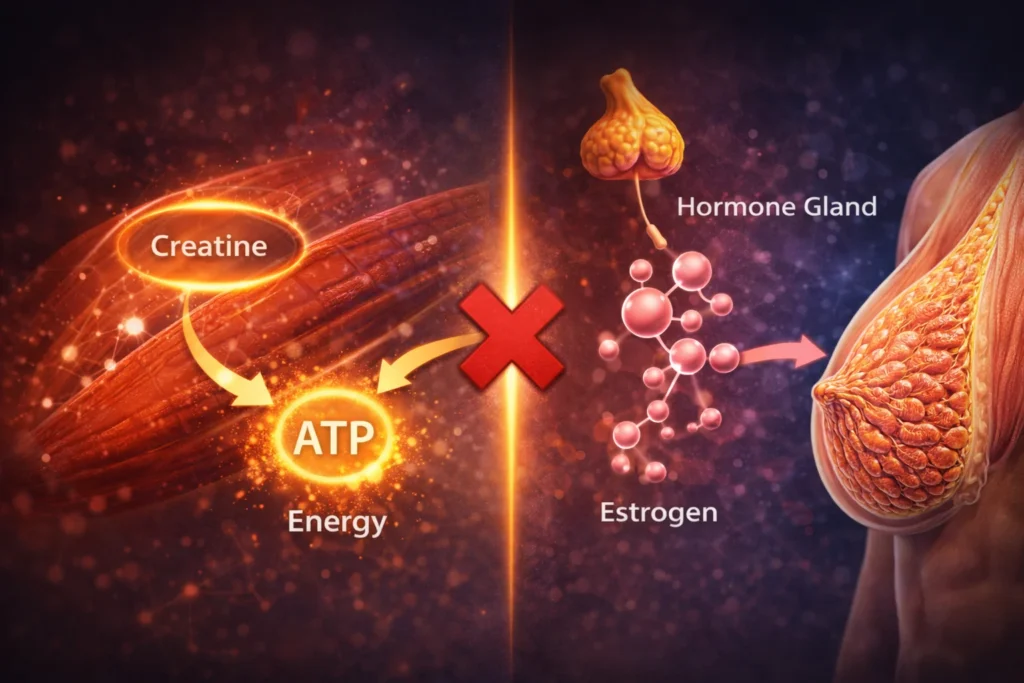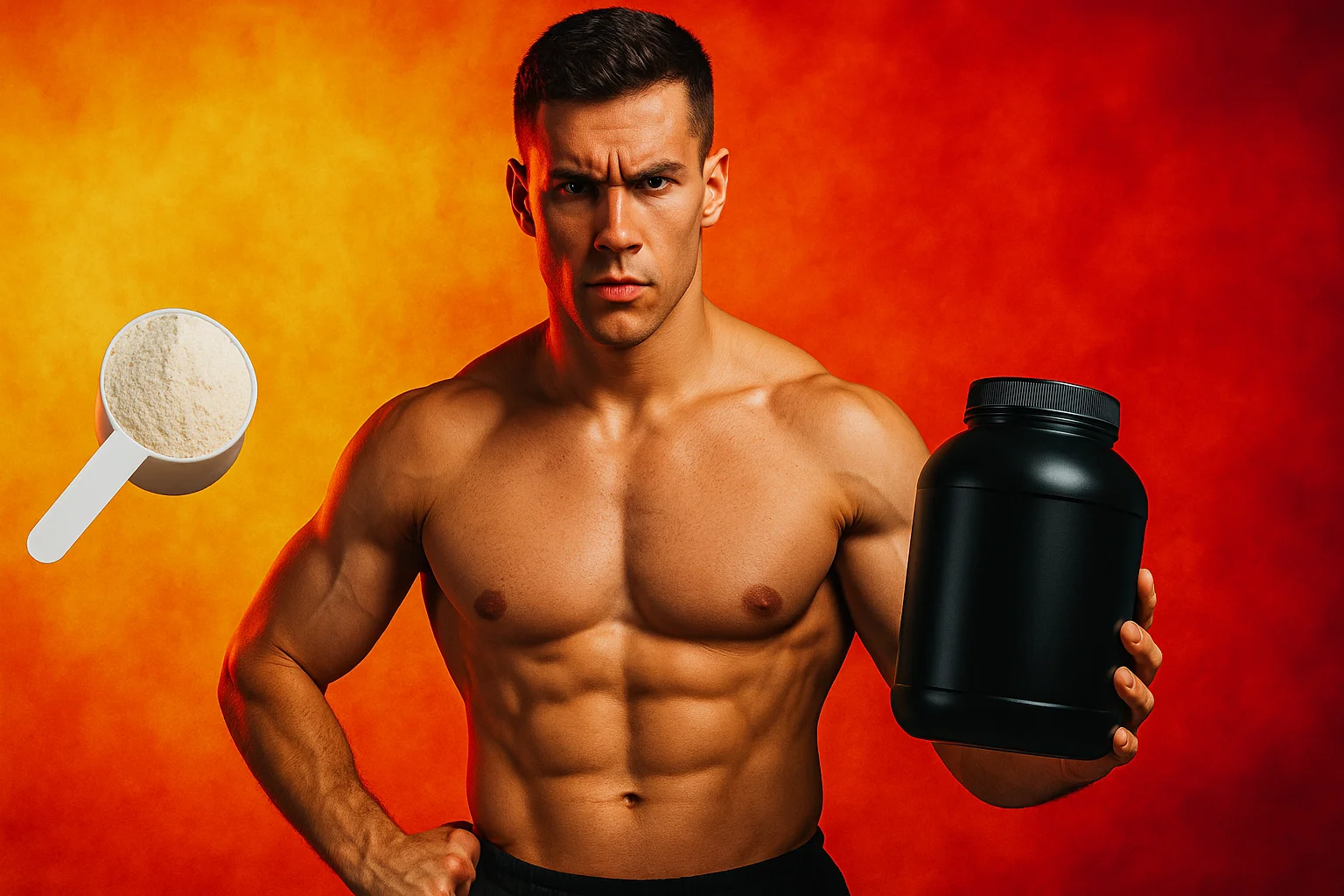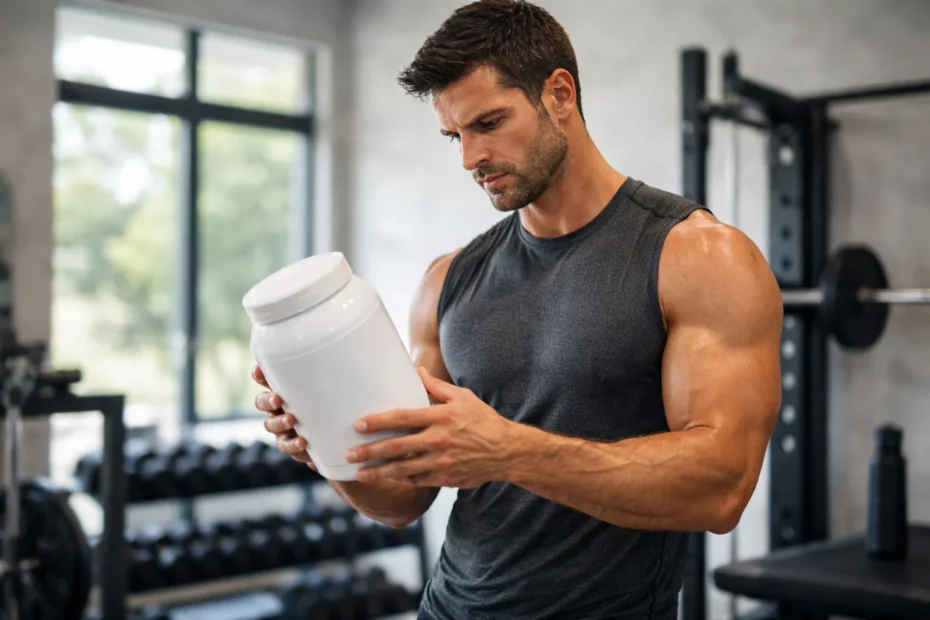Does creatine cause gyno? It’s the question that haunts every guy who’s ever stood in front of a bathroom mirror, squinting at his chest and wondering if those extra pounds of muscle come with a side order of “man boobs.” You start taking the most researched supplement in history to get stronger, and suddenly you’re terrified you might need a training bra.
If you’re worried, breathe. I’ve spent decades in the fitness industry, and I’ve heard every myth in the book. Today, we’re going to separate the gym-floor rumors from the actual science.
Medical Disclaimer: The following information is for educational purposes only and does not constitute medical advice. Gynecomastia can be a symptom of underlying health conditions. Always consult with a qualified healthcare professional or endocrinologist before starting any new supplement regimen or if you are experiencing physical symptoms.
💡 Key Takeaways: The TL;DR on Creatine and Gyno
- The Answer: No, pure creatine monohydrate does not cause gynecomastia.
- The Mechanism: Creatine affects your cell’s energy (ATP), not your hormones (estrogen).
- The Real Danger: Low-quality, “spiked” supplements are often the real culprits behind hormonal side effects.
- The Self-Check: Use the “Pinch Test” to tell the difference between real tissue growth and just a little extra chest fat.
- The Solution: Always stick to third-party tested, 100% pure creatine monohydrate.
🏃♂️ The Prime Perspective
Back in the late ’90s, when creatine first hit the mainstream, it was treated like legal steroids. I remember guys at the gym whispering about “chest sensitivity” like it was an urban legend. I fell for it, too. I’d take my five grams of monohydrate, then spend ten minutes a day poking my chest, convinced I was feeling a “lump” that wasn’t there. Looking back, I realized the only thing “growing” was my anxiety. I wasn’t experiencing a hormonal shift; I was just holding a little extra water and overthinking every sensation. The lesson I learned the hard way? Anxiety grows faster than breast tissue. If you stick to the pure stuff and keep your head on straight, your chest will be just fine.
Is It Gyno or Just Chest Fat? (The Self-Assessment)

Before we dive into the biochemistry, let’s look at what you’re actually seeing. Most guys who think they have gyno actually have pseudogynecomastia. That’s just a fancy medical term for “chest fat.”
True gynecomastia is the growth of actual glandular tissue. It’s not just “puffy” skin; it’s a firm mass. If you’re wondering, “Does creatine cause gyno?” because your chest looks a bit softer, you might just be dealing with the natural water retention that comes with creatine use.
This is a common hurdle when overcoming fitness plateaus—the body changes in ways that don’t always look pretty in the first week.
The Home Pinch Test
To figure out what you’re dealing with, try this simple check:
- Feel the Area: Use your thumb and forefinger to gently pinch the area directly behind your nipple.
- Look for the “Lump”: True gyno feels like a firm, rubbery disc or a hard grape-sized lump. It’s often sensitive or tender to the touch.
- The “Fat” Feel: If the tissue feels soft and squishy—just like the fat on your stomach or arms—it’s almost certainly just adipose tissue (fat).
| Symptom | True Gynecomastia | Pseudogynecomastia (Fat) |
| Feel | Firm, rubbery, or hard lump | Soft and doughy |
| Location | Directly behind the nipple/areola | Spread across the entire chest |
| Pain | Often tender or “zingy” | Generally painless |
If you suspect you have the firm lump, don’t panic. It doesn’t mean the creatine caused it, but it does mean you should probably chat with a doctor to rule out other hormonal imbalances.
The Science: Why Pure Creatine is Not the Culprit
Let’s get technical for a second, but I’ll keep it simple. To understand why the answer to “Does creatine cause gyno?” is a resounding “no,” you have to understand how these two things work on completely different tracks in your body.
Gyno is a Hormone Problem
Gynecomastia happens when the balance between Testosterone and Estrogen gets out of whack. Men have both. When your estrogen levels get too high relative to your testosterone, the breast tissue receptors in your chest get “turned on,” and they start growing. This is a purely hormonal event, often influenced by things like cortisol belly or systemic inflammation.
Creatine is an Energy Problem
Creatine is an amino acid derivative that your body stores in your muscles. Its only job is to help you regenerate ATP (Adenosine Triphosphate). ATP is the “fuel” your muscles use for short, explosive movements like heavy lifting or sprinting.

Creatine doesn’t talk to your endocrine system. It doesn’t bind to estrogen receptors, and it doesn’t suppress your natural testosterone production. It’s an energy booster, not a hormone modulator.
💡 What Most Guys Miss
The myth that creatine causes gyno usually stems from a 2009 study on rugby players that suggested creatine might increase DHT (dihydrotestosterone) levels. Here’s the kicker: even if DHT did increase (a finding that hasn’t been consistently replicated in larger, recent 2025 studies), DHT is an androgen that actually opposes breast tissue growth. It doesn’t cause it. The confusion usually comes from guys "stacking" creatine with prohormones or low-quality pre-workouts that contain hidden ingredients. When they get gyno from the spiked supplement, they blame the creatine because that’s the name they recognize on the label.
The Real Culprits: What Actually Causes Gyno?
If you’re experiencing symptoms and you’re sure it’s not just fat, we need to look at the usual suspects. In the world of men’s health, these are the heavy hitters:
- Anabolic Steroids & Prohormones: This is the #1 cause in the fitness community. Steroids are synthetic testosterone. When you take too much, your body tries to balance things out by converting that extra “T” into estrogen. That process is called aromatization.
- Contaminated Supplements: This is the most likely reason someone might think creatine is the problem. Some “underground” or “aggressive” supplement companies have been caught “spiking” their products with cheap prohormones to ensure users see massive results. You think you’re taking pure creatine, but you’re actually taking a low-dose steroid.
- Medications: Many common drugs can trigger gyno. This includes certain anti-anxiety meds, heart medications (like spironolactone), and even some antibiotics.
- Alcohol and Marijuana: Heavy alcohol use can damage the liver, which is responsible for clearing estrogen from your blood. Marijuana has also been linked to hormonal disruptions that can lead to “puffy” symptoms.
Common Gyno-Causing Medications
| Medication Type | Common Examples | Mechanism |
| Heart Meds | Spironolactone, Digoxin | Blocks androgens |
| Gastro Meds | Cimetidine (Tagamet) | Weak anti-androgen |
| Psych Meds | Diazepam (Valium) | Alters hormone metabolism |
How to Protect Yourself: The Safety Protocol
So, how do you take creatine without the fear? It all comes down to purity. If you buy a bag of white powder from a guy in a trench coat at the gym, you’re rolling the dice. If you buy from a reputable source, the risk is zero.
Look for the “Golden Labels”
The supplement industry isn’t as strictly regulated as the food industry. That’s why you need third-party verification. Look for these logos:
- NSF Certified for Sport: The gold standard. It means the product has been tested for over 200 banned substances and contaminants.
- Informed-Sport: Another highly respected certification that ensures the product is clean.
- Creapure®: This is a trademark for high-quality, German-made creatine monohydrate. It is the purest form available.
The Gold Standard: Thorne Creatine
If you want to eliminate all doubt, I recommend Thorne Creatine. Thorne addresses the fear of contamination head-on by offering an elite, clinical-grade micronized creatine monohydrate.
It is NSF Certified for Sport®, meaning every batch is rigorously tested for over 200 athletic-banned substances and contaminants. This isn’t just a supplement; it’s an investment in safety and performance.
👉 Check the latest price on Amazon: Thorne Creatine – Micronized Creatine Monohydrate Powder
Affiliate Disclaimer: This post may contain affiliate links, which means I may receive a small commission if you make a purchase through my links, at no extra cost to you. I only recommend products I genuinely believe in and would use myself. Your support helps keep this blog running and allows me to continue creating free content to help you achieve your best skin. Thank you for support!
Creatine Side Effects: The Stuff That Actually Happens
While we can confidently say “no” to the question “Does creatine cause gyno?”, that doesn’t mean it has zero side effects. However, most are minor and manageable.
- Water Retention: Creatine draws water into the muscle cells. This is good for muscle growth, but it can make you feel “heavy” or “puffy” in the first week. This is not gyno; it’s just hydration.
- Digestive Issues: If you take too much at once (loading phase), you might get a “bubbly” stomach. Skip the loading phase and just take 5 grams a day.
- Weight Gain: You will likely gain 2-5 pounds in the first month. Most of that is water inside the muscles, not body fat. This is often misunderstood in the context of testosterone boosters and weight loss.
For a deeper look at what to expect, check our guide on how long it takes for supplements to work.
✅ Your 24-Hour Action Plan
- Step 1: Perform the “Pinch Test” described above. If you feel a hard, painful lump, schedule an appointment with your GP to check your baseline hormone levels.
- Step 2: Check the label of your current creatine. If it isn’t third-party tested (NSF or Informed-Sport), toss it and order a certified 100% pure monohydrate like Thorne.
- Step 3: Hydrate. Drink at least 3-4 liters of water today to help your body manage the natural water-shuffling that creatine performs in your muscle cells.
Conclusion: Take the Wins, Ignore the Myths
At the end of the day, creatine is the most researched, safest, and most effective supplement you can put in your body to improve performance.
The idea that it causes man boobs is a classic case of “guilt by association.” Because it’s used by bodybuilders (some of whom use steroids), and steroids cause gyno, people incorrectly connected the dots.
If you’re training hard, eating right, and using high-quality testosterone boosters or creatine, you’re on the right track. Don’t let a gym-floor myth stop you from reaching your prime.
Does Creatine Cause Gyno? (Common Questions)
Does creatine increase estrogen levels in men?
No. There is no clinical evidence that creatine supplementation increases estrogen levels. Creatine works on the ATP-PC energy system within the muscle cells and does not interact with the endocrine glands responsible for estrogen production.
Can I get gyno if I stop taking creatine?
No. Stopping creatine will result in a loss of water weight from your muscles, but it will not trigger a hormonal crash or the development of breast tissue. If you notice symptoms after stopping, they are likely caused by an underlying issue that was present before or during your supplementation.
What should I do if my nipples feel sore while taking creatine?
First, perform a self-check to see if you have a firm lump. If you do, see a doctor. If you don’t, evaluate your other supplements. Soreness is often caused by high-stimulant pre-workouts or contaminated products, not pure creatine.
Is creatine monohydrate safer than other forms?
Creatine monohydrate is the “gold standard.” It has the most safety data and is the least likely to be contaminated if you buy from a reputable brand. Other “fancy” forms like HCL or Ethyl Ester don’t have the same long-term safety record.
Will creatine make my man boobs look bigger?
If you have existing chest fat (pseudogynecomastia), the initial water retention from creatine might make the area look slightly more “puffy.” However, as you build muscle underneath that fat, your chest will eventually look firmer and more defined.



